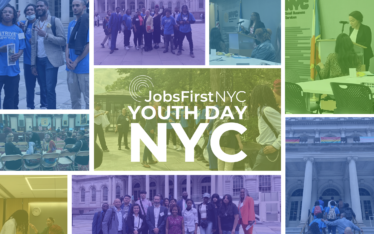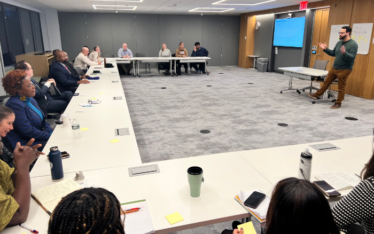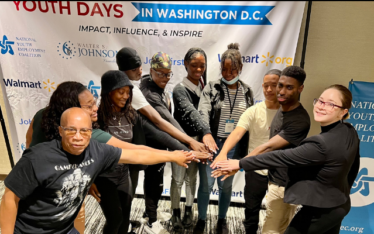Good afternoon, Chairman Council Member Daniel Dromm and other distinguished council members of the Education Committee. My name is Chantella Mitchell and I am the Policy and Program Associate at JobsFirstNYC, a policy to practice intermediary focused on the issues of young adults who are out of school and out of work or underemployed.
Today, there are more than 184,000 New Yorkers 16-24 who are out of school and out of work. This figure includes young adults who have dropped out of high school as well as those who have completed school and are unprepared to successfully transition to higher education or employment. In addition to the large out-of-school, out-of-work young adult population in New York City, there is a large group of young New Yorkers who are underemployed. According to a 2016 report from the New York City Comptroller, greater than 47 percent of 16-25-year-olds in New York City work in low-wage service jobs or retail. We believe that delivering quality career preparation and work experience programs within the K–12 system is one necessary strategy to decrease the numbers of young adults who enter the out-of-school, out-of-work population, and those who graduate and enter the labor market unprepared for living-wage careers.
Career and Technical Education (CTE) programs are one example of this effective strategy. The strength of CTE programming includes its focus on specific sectors. As JobsFirstNYC highlighted in its 2016 report, Optimizing Talent: The Promise and the Perils of Adapting Sectoral Strategies for Young Workers, when developed and resourced properly, sectoral strategies can successfully prepare young adults for in-demand, well-paying jobs. Moreover, CTE programming includes structured engagement with specific businesses that is mutually beneficial for students and for employers looking to develop talent pipelines within their companies and industries.
In addition to partnering with employers, some CTE schools also partner with community colleges to offer students college credit or even Associate’s Degrees as part of an extended high school experience – while the seven existing 9-14 Early College CTE schools in NYC are fairly new, they are showing positive employment and college enrollment outcomes for graduates. Finally, local CTE programming has proven its value through some promising early outcomes. A 2014 Community Service Society study found that graduation rates for students at CTE were overall better than those at non-CTE schools, and black and Latino male students at CTE schools had significantly higher graduation rates than those at traditional public schools.
However, as the City prepares for the expansion of CTE programming, it must address several implementation challenges. There is a need for increased data collection around employment outcomes for CTE graduates. The same 2014 CSS report found that while graduation rates were higher for many CTE students, CTE students had lower levels of college readiness and there was no available employment outcome data on CTE graduates from the Department of Education. In order to truly prepare students for in-demand careers, internal CTE processes should be made more efficient to allow schools and their partners to be more responsive to the local job market and economic shifts. An August 2016 article from Chalkbeat New York reported that the slow moving and inflexible bureaucracy involved with becoming CTE certified by the NY State DOE was the greatest challenge to partnering with schools for CTE work. Finally, CTE programming should not be the only career preparation and work experience programming option for students. Too much focus on CTE exclusively limits investments and attention for other successful in-school career and education program models run by nonprofits and community colleges. While some of these programs offer training in one specific sector, others focus on student choice and career exploration, offering students the flexibility to choose from an array of sectors, unlike CTE. These programs also offer students a successive learning framework, building on students’ knowledge and experience from 9-12th grade.
At JobsFirstNYC, our goal is for all young New Yorkers to benefit from the vibrant economic life of New York City. We believe that CTE, when implemented well, is one strategy for decreasing the numbers of young adults who are out-of-school and out-of-work and underemployed. We urge the City to:
- Require that the DOE provide more information around certificate attainment, employment outcomes, and post-secondary enrollment related to the CTE training sector, specified by bill number 1099;
- Collect evidence related to employer involvement and advisement in CTE schools to ensure programs are market-driven; and
Improve the implementation of successful CTE programming while investing in complementary career preparation and work experience programs for students. JobsFirstNYC was recently commissioned by the James and Judith K. Dimon Foundation to examine the in-school career exploration and work experience programs in the Bronx, including CTE, in context of in-demand occupations and economic development in the borough. We are happy to share this report with the Council upon completion and look forward to the continued work together.
Thank you





